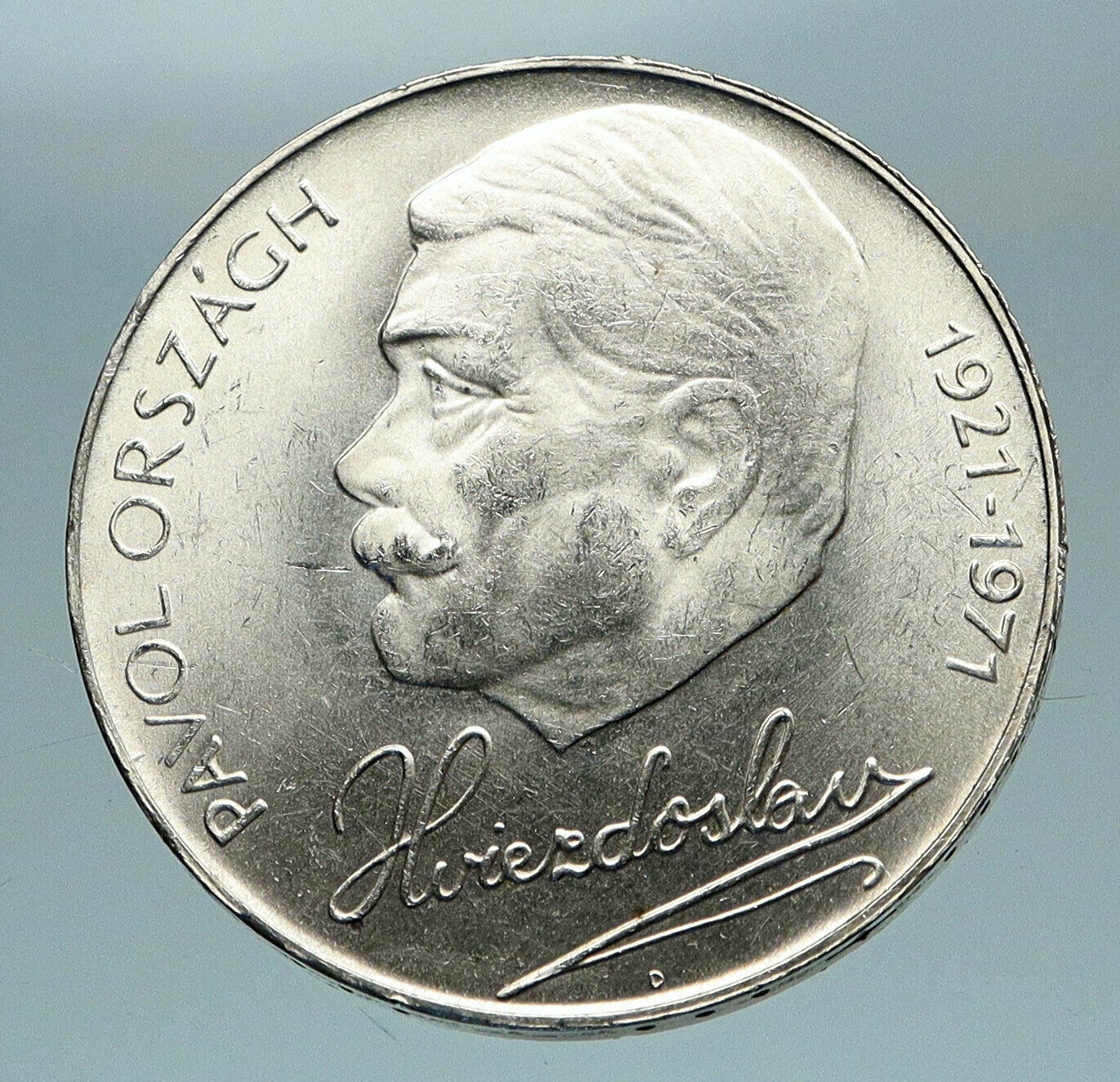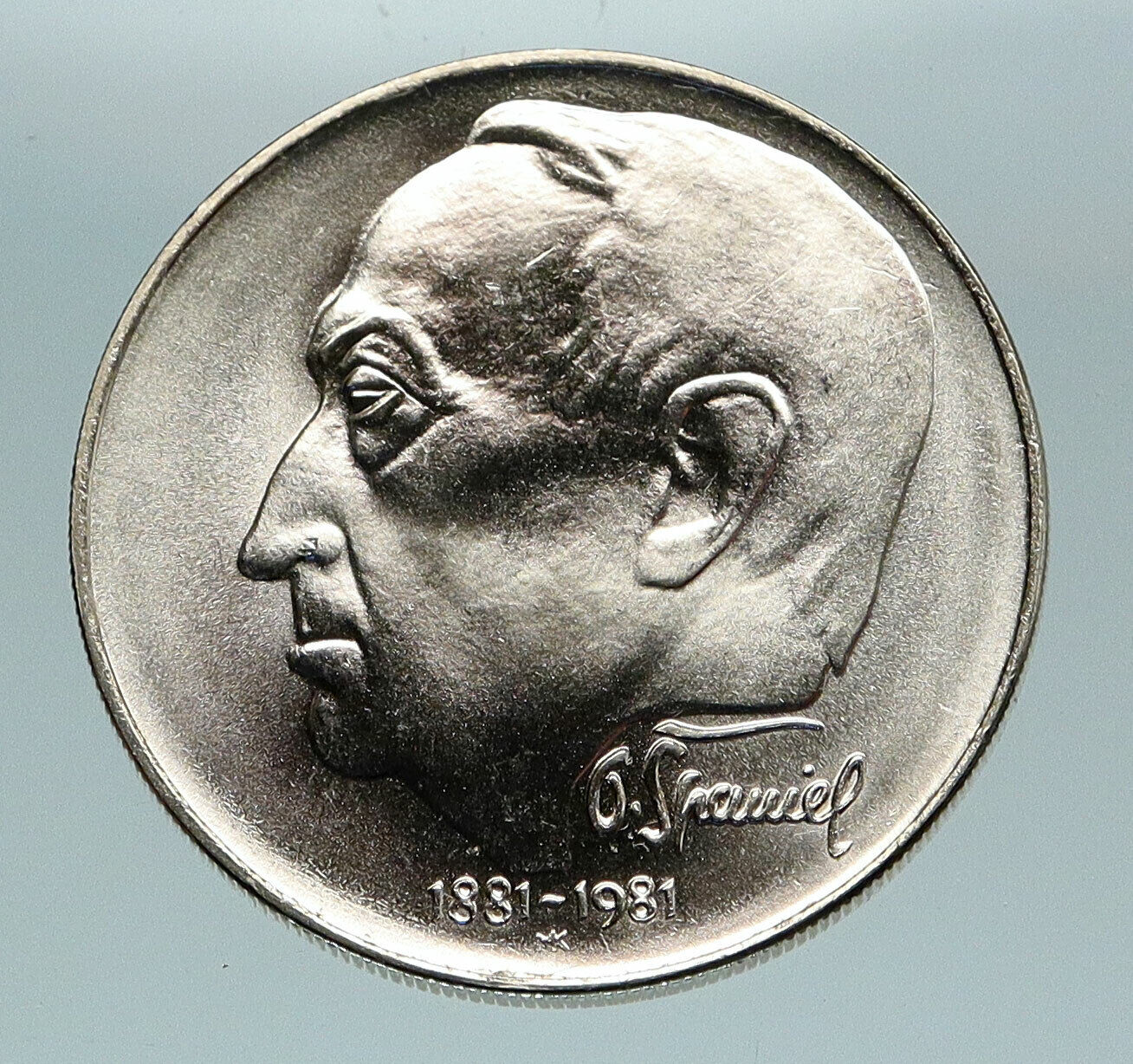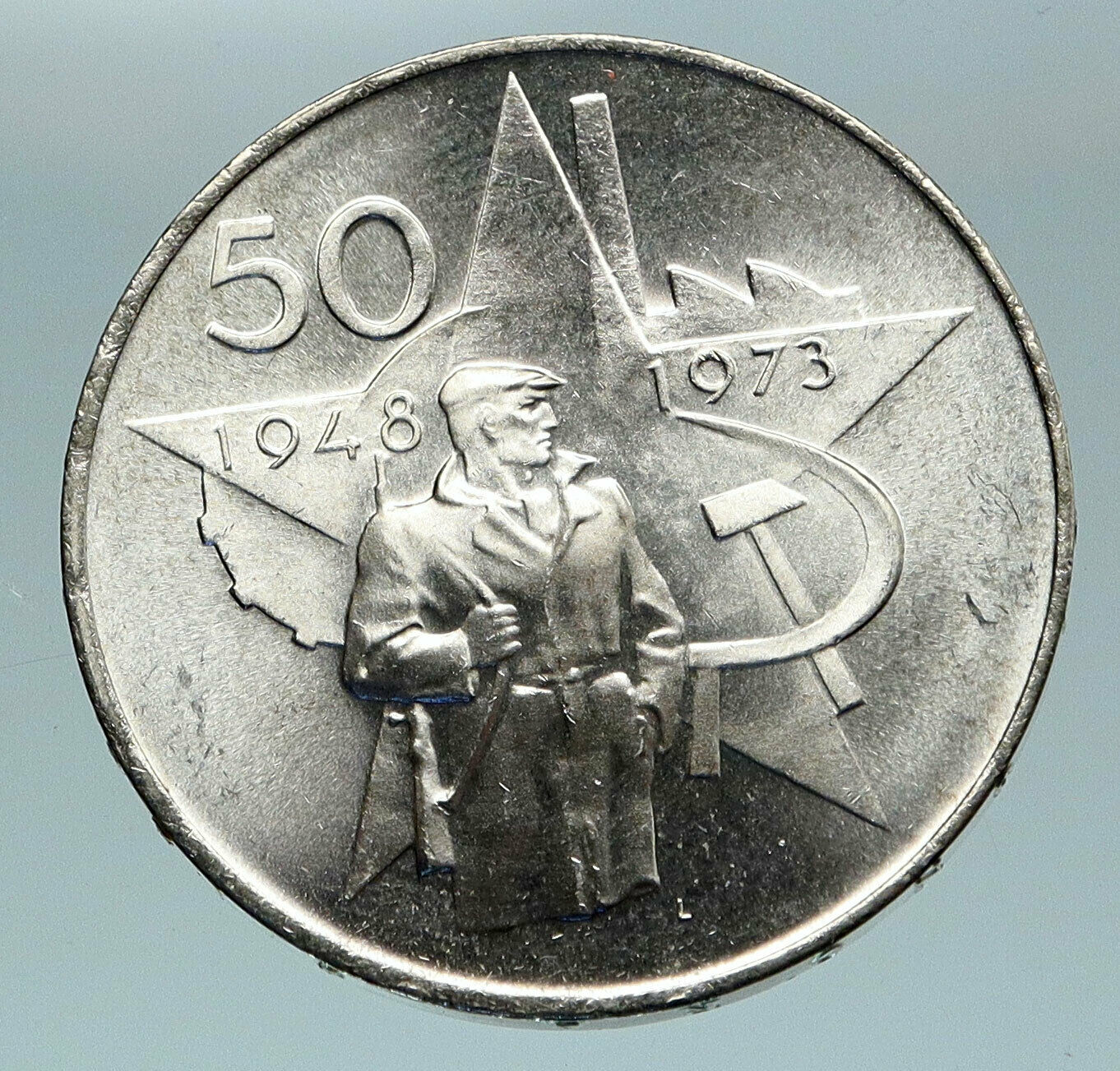|
Czech Republic – Czechoslovakia
30th Anniversary – Communist Party
1951 Silver 100 Korun 31mm (13.90 grams) 0.500 Silver (0.2251 oz. ASW)
Reference: KM# 33, Schön# 38 | Engraver: Otakar Španiel
REPUBLIKA ČESKOSLOVENSKÁ 100, Czech lion with Slovak shield.
KLEMENT GOTTWALD TRICET LET KOMUNISTICKÉ STRANY ČESKOSLOVENSKA 1921 1951, Klement Gottwald bust facing right.
Edge Design:
Plain with stars and waves.
You are bidding on the exact item pictured, provided with a Certificate of Authenticity and Lifetime Guarantee of Authenticity.
.jpg/200px-Bundesarchiv_Bild_183-R90009,_Budapest,_II._Weltfestspiele,_Festumzug,_tschechische_Delegation_(cropped_KG).jpg) Klement Gottwald (23 November 1896 – 14 March 1953) was a Czech communist politician, who was the leader of the Communist Party of Czechoslovakia from 1929 until his death in 1953–titled as General Secretary until 1945 and as Chairman from 1945 to 1953. He was the first leader of Communist Czechoslovakia from 1948 to 1953. Klement Gottwald (23 November 1896 – 14 March 1953) was a Czech communist politician, who was the leader of the Communist Party of Czechoslovakia from 1929 until his death in 1953–titled as General Secretary until 1945 and as Chairman from 1945 to 1953. He was the first leader of Communist Czechoslovakia from 1948 to 1953.
He was the 14th Prime Minister of Czechoslovakia from July 1946 until June 1948, the first Communist to hold the post. In June 1948, he was elected as Czechoslovakia’s first Communist president, four months after the 1948 coup d’état in which his party seized power with the backing of the Soviet Union. He held the post until his death.
In 1926, Gottwald became a functionary of the Communist Party, and editor of the Communist Press. From 1926 to 1929 he worked in Prague, where he aided the Secretariat of the KSČ to form a pro-Moscow opposition against the then in power anti-Moscow leadership. Since 1928 he was a member of the Comintern. Following Comintern policy initiated by Stalin, he carried out the Bolshevization of the Party. In February 1929, at the Fifth Congress of the KSČ, Gottwald was elected party general secretary, alongside Guttmann, Šverma, Slansky, Kopecky and the Reimans (known as “the Karlin boys”). In the second half of 1930 the Communist Party carried out a number of reforms in accordance and response with the changes in those of the foreign policy of the Soviet Union, namely the introduction of the policy of the formation of the “Popular front against Fascism”. In September and October 1938 Gottwald was one of the main leaders of the opposition against the adoption of the Munich Agreement.
After the banning of the Communist Party Gottwald emigrated to the Soviet Union in November 1938. While there, he opposed the party policy of backing the Molotov-Ribbentrop pact of 1939. After the attack on the Soviet Union in June 1941, Soviet leadership saw the front against fascism as a great opportunity to assert themselves in Czechoslovakia, promoting interest in supporting Gottwald after the liberation of Czechoslovakia. In 1943 Gottwald agreed with representatives of the Czechoslovak-government-in-exile located in London, along with President Edvard Beneš, to unify domestic and foreign anti-fascist resistance and form the National Front. This proved helpful for Gottwald as it helped secure Communist influence in post-war Czechoslovakia.
In 1945, Gottwald gave up the general secretary’s post to Rudolf Slánský and was elected to the new position of party chairman. On 10 May 1945 Gottwald returned to Prague as the deputy premier under Zdeněk Fierlinger and as the chairman of the National Front. In March 1946, he became prime minister after leading the KSČ to a 38% share of the vote. This was easily the best showing for a Czechoslovak party in a free election at the time; previously, no party had ever won more than 25 percent. Gottwald was a firm supporter of the expulsion of ethnic Germans from Czechoslovakia, gaining mainstream credibility with many Czechs through the use of nationalist rhetoric, exhorting the population to “prepare for the final retribution for White Mountain, for the return of the Czech lands to the Czech people. We will expel for good all descendants of the alien German nobility.”
 The Czech Republic also known by its short-form name, Czechia, is a landlocked country in Central Europe bordered by Germany to the west, Austria to the south, Slovakia to the east and Poland to the northeast. The Czech Republic covers an area of 78,866 square kilometres (30,450 sq mi) with a mostly temperate continental climate and oceanic climate. It is a unitary parliamentary republic, with 10.6 million inhabitants; its capital and largest city is Prague, with 1.3 million residents. Other major cities are Brno, Ostrava, Olomouc and Pilsen. The Czech Republic is a member of the European Union (EU), NATO, the OECD, the United Nations, the OSCE, and the Council of Europe. The Czech Republic also known by its short-form name, Czechia, is a landlocked country in Central Europe bordered by Germany to the west, Austria to the south, Slovakia to the east and Poland to the northeast. The Czech Republic covers an area of 78,866 square kilometres (30,450 sq mi) with a mostly temperate continental climate and oceanic climate. It is a unitary parliamentary republic, with 10.6 million inhabitants; its capital and largest city is Prague, with 1.3 million residents. Other major cities are Brno, Ostrava, Olomouc and Pilsen. The Czech Republic is a member of the European Union (EU), NATO, the OECD, the United Nations, the OSCE, and the Council of Europe.
It is a developed country with an advanced, high income export-oriented social market economy based in services, manufacturing and innovation. The UNDP ranks the country 14th in inequality-adjusted human development. The Czech Republic is a welfare state with a “continental” European social model, a universal health care system, tuition-free university education and is ranked 14th in the Human Capital Index. It ranks as the 6th safest or most peaceful country and is one of the most non-religious countries in the world, while achieving strong performance in democratic governance.
<img src="https://upload.wikimedia.org/wikipedia/commons/thumb/e/ed/Coat_of_arms_of_the_Czech_Republic.svg/85px-Coat_of_arms_of_the_Czech_Republic.svg.png" align="left" the="" czech="" republic="" includes="" historical="" territories="" of="" bohemia,="" moravia,="" and="" silesia.="" state="" was="" formed="" in="" late="" 9th="" century="" as="" duchy="" bohemia="" under="" great="" moravian="" empire.="" after="" fall="" empire="" 907,="" centre="" power="" transferred="" from="" moravia="" to="" přemyslid="" dynasty.="" 1002,="" formally="" recognized="" an="" imperial="" holy="" roman="" along="" with="" kingdom="" germany,="" burgundy,="" italy,="" numerous="" other="" territories,="" becoming="" 1198="" reaching="" its="" greatest="" territorial="" extent="" 14th="" century.="" beside="" itself,="" king="" ruled="" lands="" bohemian="" crown,="" holding="" a="" vote="" election="" emperor;="" prague="" seat="" periods="" between="" 17th="" hussite="" wars="" 15th="" driven="" by="" protestant="" reformation,="" faced="" economic="" embargoes="" defeated="" five="" consecutive="" crusades="" proclaimed="" leaders="" catholic="" church.=""
 Following the Battle of Mohács in 1526, the whole Crown of Bohemia was gradually integrated into the Habsburg Monarchy alongside the Archduchy of Austria and the Kingdom of Hungary. The Protestant Bohemian Revolt (1618-20) against the Catholic Habsburgs led to the Thirty Years’ War. After the Battle of the White Mountain, the Habsburgs consolidated their rule, eradicated Protestantism and reimposed Catholicism, and also adopted a policy of gradual Germanization. This contributed to the anti-Habsburg sentiment. A long history of resentment of the Catholic Church followed and still continues. With the dissolution of the Holy Roman Empire in 1806, the Bohemian Kingdom became part of the German Confederation 1815-1866 as part of Austrian Empire (1804 to 1867) and the Czech language experienced a revival as a consequence of widespread romantic nationalism. In the 19th century, the Czech lands became the industrial powerhouse of the monarchy and were subsequently the core of the Republic of Czechoslovakia, which was formed in 1918 following the collapse of the Austro-Hungarian Empire after World War I. Following the Battle of Mohács in 1526, the whole Crown of Bohemia was gradually integrated into the Habsburg Monarchy alongside the Archduchy of Austria and the Kingdom of Hungary. The Protestant Bohemian Revolt (1618-20) against the Catholic Habsburgs led to the Thirty Years’ War. After the Battle of the White Mountain, the Habsburgs consolidated their rule, eradicated Protestantism and reimposed Catholicism, and also adopted a policy of gradual Germanization. This contributed to the anti-Habsburg sentiment. A long history of resentment of the Catholic Church followed and still continues. With the dissolution of the Holy Roman Empire in 1806, the Bohemian Kingdom became part of the German Confederation 1815-1866 as part of Austrian Empire (1804 to 1867) and the Czech language experienced a revival as a consequence of widespread romantic nationalism. In the 19th century, the Czech lands became the industrial powerhouse of the monarchy and were subsequently the core of the Republic of Czechoslovakia, which was formed in 1918 following the collapse of the Austro-Hungarian Empire after World War I.
Czechoslovakia remained the only democracy in this part of Europe in the interwar period. However, the Czech part of Czechoslovakia was occupied by Germany in World War II, while the Slovak region became the Slovak Republic; Czechoslovakia was liberated in 1945 by the armies of the Soviet Union and the United States. Most of the three millions of the German-speaking minority were expelled following the war. The Communist Party of Czechoslovakia won the 1946 elections and after the 1948 coup d’état, Czechoslovakia became a one-party communist state under Soviet influence. In 1968, increasing dissatisfaction with the regime culminated in a reform movement known as the Prague Spring, which ended in a Soviet-led invasion. Czechoslovakia remained occupied until the 1989 Velvet Revolution, when the communist regime collapsed and market economy was reintroduced. On 1 January 1993, Czechoslovakia peacefully dissolved, with its constituent states becoming the independent states of the Czech Republic and Slovakia. The Czech Republic joined NATO in 1999 and the EU in 2004.
|




.jpg/200px-Bundesarchiv_Bild_183-R90009,_Budapest,_II._Weltfestspiele,_Festumzug,_tschechische_Delegation_(cropped_KG).jpg) Klement Gottwald (23 November 1896 – 14 March 1953) was a Czech communist politician, who was the leader of the Communist Party of Czechoslovakia from 1929 until his death in 1953–titled as General Secretary until 1945 and as Chairman from 1945 to 1953. He was the first leader of Communist Czechoslovakia from 1948 to 1953.
Klement Gottwald (23 November 1896 – 14 March 1953) was a Czech communist politician, who was the leader of the Communist Party of Czechoslovakia from 1929 until his death in 1953–titled as General Secretary until 1945 and as Chairman from 1945 to 1953. He was the first leader of Communist Czechoslovakia from 1948 to 1953. The Czech Republic also known by its short-form name, Czechia, is a landlocked country in Central Europe bordered by Germany to the west, Austria to the south, Slovakia to the east and Poland to the northeast. The Czech Republic covers an area of 78,866 square kilometres (30,450 sq mi) with a mostly temperate continental climate and oceanic climate. It is a unitary parliamentary republic, with 10.6 million inhabitants; its capital and largest city is Prague, with 1.3 million residents. Other major cities are Brno, Ostrava, Olomouc and Pilsen. The Czech Republic is a member of the European Union (EU), NATO, the OECD, the United Nations, the OSCE, and the Council of Europe.
The Czech Republic also known by its short-form name, Czechia, is a landlocked country in Central Europe bordered by Germany to the west, Austria to the south, Slovakia to the east and Poland to the northeast. The Czech Republic covers an area of 78,866 square kilometres (30,450 sq mi) with a mostly temperate continental climate and oceanic climate. It is a unitary parliamentary republic, with 10.6 million inhabitants; its capital and largest city is Prague, with 1.3 million residents. Other major cities are Brno, Ostrava, Olomouc and Pilsen. The Czech Republic is a member of the European Union (EU), NATO, the OECD, the United Nations, the OSCE, and the Council of Europe.  Following the Battle of Mohács in 1526, the whole Crown of Bohemia was gradually integrated into the Habsburg Monarchy alongside the Archduchy of Austria and the Kingdom of Hungary. The Protestant Bohemian Revolt (1618-20) against the Catholic Habsburgs led to the Thirty Years’ War. After the Battle of the White Mountain, the Habsburgs consolidated their rule, eradicated Protestantism and reimposed Catholicism, and also adopted a policy of gradual Germanization. This contributed to the anti-Habsburg sentiment. A long history of resentment of the Catholic Church followed and still continues. With the dissolution of the Holy Roman Empire in 1806, the Bohemian Kingdom became part of the German Confederation 1815-1866 as part of Austrian Empire (1804 to 1867) and the Czech language experienced a revival as a consequence of widespread romantic nationalism. In the 19th century, the Czech lands became the industrial powerhouse of the monarchy and were subsequently the core of the Republic of Czechoslovakia, which was formed in 1918 following the collapse of the Austro-Hungarian Empire after World War I.
Following the Battle of Mohács in 1526, the whole Crown of Bohemia was gradually integrated into the Habsburg Monarchy alongside the Archduchy of Austria and the Kingdom of Hungary. The Protestant Bohemian Revolt (1618-20) against the Catholic Habsburgs led to the Thirty Years’ War. After the Battle of the White Mountain, the Habsburgs consolidated their rule, eradicated Protestantism and reimposed Catholicism, and also adopted a policy of gradual Germanization. This contributed to the anti-Habsburg sentiment. A long history of resentment of the Catholic Church followed and still continues. With the dissolution of the Holy Roman Empire in 1806, the Bohemian Kingdom became part of the German Confederation 1815-1866 as part of Austrian Empire (1804 to 1867) and the Czech language experienced a revival as a consequence of widespread romantic nationalism. In the 19th century, the Czech lands became the industrial powerhouse of the monarchy and were subsequently the core of the Republic of Czechoslovakia, which was formed in 1918 following the collapse of the Austro-Hungarian Empire after World War I. 




